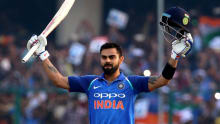Formula 1 and 10 Leadership Lessons
A compelling vision with clearly specified and articulated goals generates its own momentum for achievement
Great leaders understand the power of teams,which collaborate and harness each other's strengths
Success stories, be it of an individual or a team, are always inspiring. A thread bare analysis of the key elements of success provides key insights that individuals as well as corporate sector can learn from.This article focuses on ten key leadership lessons derived from the recently concluded Formula 1.
1. LASER FOCUS: The way Vettel led from the first to the last lap in a never ending loop covering 307.249 km in 1hr 30 mins 35 secs was a testimony to his concentration and motivation to win. He never wavered or became complacent; clocking the fastest lap time of 1:27:249 minutes in the last lap when he could have just cruised in to the chequered flag.
Keep an eye on the target. A compelling vision with clearly specified and articulated goals generates its own momentum for achievement.
2. TEAM WORK: The pit stops were pure symphony on steroids, when tyres were changed and car readjusted. The pit teams’ function is critical to the overall performance and timed to hundredth of a second. The best crews were taking about 3.2 to 3.4 seconds. In fact, Daniel Ricciardo lost a place because of a poor pit stop.
Job description, role and responsibilities need to be clearly communicated so that each person knows what is expected of him and how his efforts (KRAs) contribute to the ultimate goal. For efficiency and effectiveness, there needs to be specialization of functions.
3. TRUST: A screaming F1 projectile weighing about 500 kgs hurtling towards a pit stop at over 100 kmph is brought to dead halt in front of the jackman (who lifts the car). This is an extremely hazardous operation as the front jackman stands facing the incoming car, completely trusting the driver to stop in time.
Trust amongst the team members and respect for each person’s role, makes for a high performance team.
4. COMMUNICATION: Real time telemetry between the sensors embedded in the F1 car and the pit crew, factory engineers monitoring from their car plants thousands of kms away and the driver, calls for precise and relevant communication between the whole team.
The more fluid a situation is, greater the variables to be taken into account are. Large team co-ordination, calls for clear communication lines, pre-determined protocols for escalation and establishing what is relevant. The leader must be transparent in his communications.
5. COLLABORATION: Speed, intelligence and courage are the attributes of the F1 team members. However, it is the collaboration between the driver, car manufacturer and crew that makes for a great F1 team. RBR-Renault win gave them a 153 point lead over their nearest rivals McLaren-Mercedes. In fact, F1 Team championships are as prestigious as F1 Driver standings.
Great leaders understand the power of teams, which collaborate and harness each other’s strengths. It is a tight rope between optimising individual brilliance and the organizational system; so the sum is greater than the parts.
6. STRATEGY: Teams plan their season strategy well in advance of the first race. It is not all about guts and glory; being the first off the starter gates and going hell-for-leather to the finish line are what matter the most. Tactics are put in place for each race. Innovation plays a large part i.e. DRS system. It is also about attention to detail. Vettel was seen in the practice sessions going around the track making notes about each turn and kerb heights.
Good leaders ensure they have a strategy, which not only plays to their strengths but is creative. Attention to detail and benchmarking against competition is equally essential. Most importantly, these plans are dynamic with flexibility to adjust to new realities.
7. RISK-REWARD: The races started after a minute’s silence dedicated to Dan Wheldon (Indy 500 winner) and Marco Simoncelli (MotoGP rider), drivers who were both killed in races just prior to this. This is a high risk–high reward sport. It is definitely not for the faint-hearted or those lacking deep pockets. It takes around $170 million to run a team in F1. Winning drivers and teams are awarded large prize money, lavish lifestyles and adulation of fans.
Leadership also demands courage and will, backed by the ability to access resources by managing the eco-system of the organization. Deftness and decisiveness along with measured risk-taking ability make a great leader.
8. COACHING AND FEEDBACK: Once the F1 driver puts on his helmet and settles into the cockpit of his racing machine, he is not on his own. The engineers analyzing the data, practice/race briefing and debriefings and team strategy sessions, result in constant feedback. An attitude of improving performance pervades the team.
Good leaders are always alive to feedback and do not hesitate to use coaches as sounding boards for their ideas. Effective leaders know their strengths and are confident in seeking coaching for areas of growth.
9. HANDLING SUCCESS: Though there is a lot of adrenaline induced fist-pumping and spraying of champagne, there is also a constant awareness of staying relevant in the fast changing world of engine and tyre technology, team tactics and new driving skills. Vettel said he is still hungry for more wins.
Leadership involves re-inventing oneself to stay relevant to the current challenges and demands of the new team dynamics.
10. HAVING FUN: Vettel during the post-race interview said, “Enjoy life and at the end, that is what it is all about. If your life comes to an end, it is more the thoughts, the emotions, the friends, the friendships you take with you rather than whatever you have in your bank.”
Leadership is also about having fun; it is about rewarding and recognizing people along the journey and leaving an inspiring legacy in the organization.
Rakesh Kochhar is a Business Performance & Executive Coach and he can be contacted at rakesh.kochhar@coachnme.in











